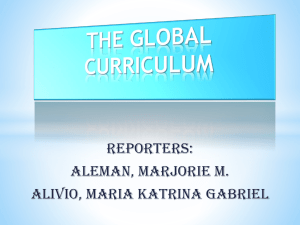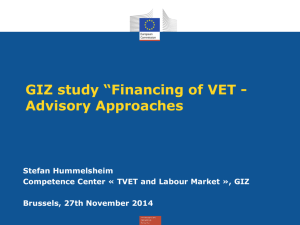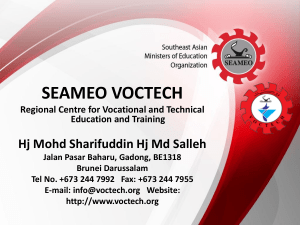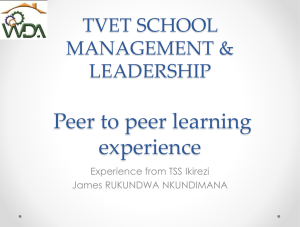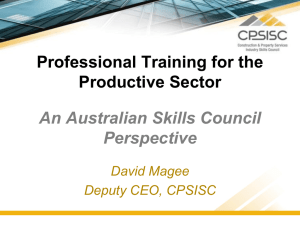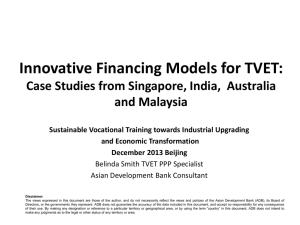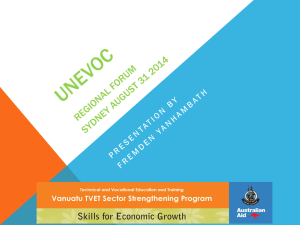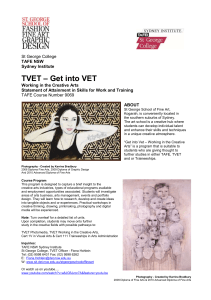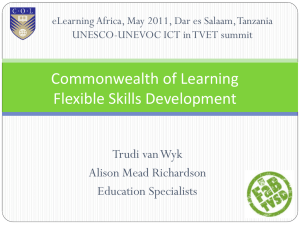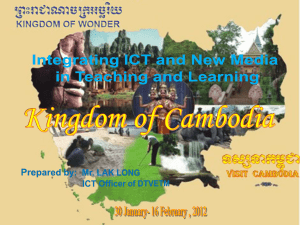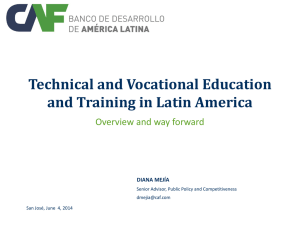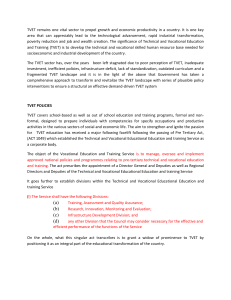“The importance of values education for TVET and its economic and
advertisement
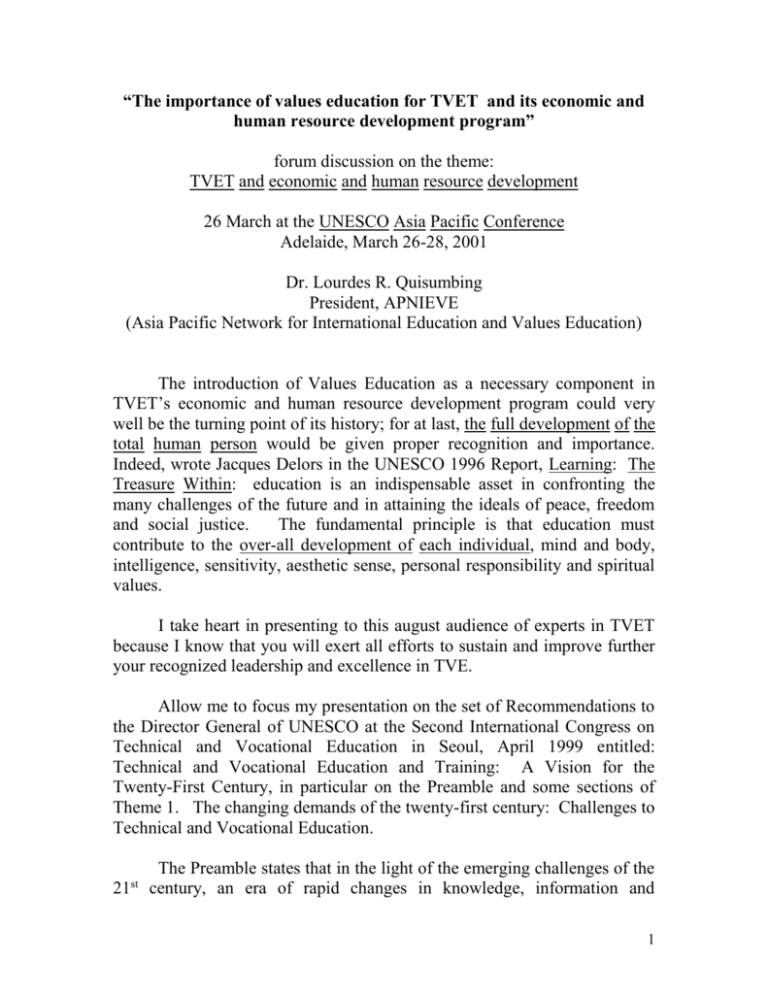
“The importance of values education for TVET and its economic and human resource development program” forum discussion on the theme: TVET and economic and human resource development 26 March at the UNESCO Asia Pacific Conference Adelaide, March 26-28, 2001 Dr. Lourdes R. Quisumbing President, APNIEVE (Asia Pacific Network for International Education and Values Education) The introduction of Values Education as a necessary component in TVET’s economic and human resource development program could very well be the turning point of its history; for at last, the full development of the total human person would be given proper recognition and importance. Indeed, wrote Jacques Delors in the UNESCO 1996 Report, Learning: The Treasure Within: education is an indispensable asset in confronting the many challenges of the future and in attaining the ideals of peace, freedom and social justice. The fundamental principle is that education must contribute to the over-all development of each individual, mind and body, intelligence, sensitivity, aesthetic sense, personal responsibility and spiritual values. I take heart in presenting to this august audience of experts in TVET because I know that you will exert all efforts to sustain and improve further your recognized leadership and excellence in TVE. Allow me to focus my presentation on the set of Recommendations to the Director General of UNESCO at the Second International Congress on Technical and Vocational Education in Seoul, April 1999 entitled: Technical and Vocational Education and Training: A Vision for the Twenty-First Century, in particular on the Preamble and some sections of Theme 1. The changing demands of the twenty-first century: Challenges to Technical and Vocational Education. 21 st The Preamble states that in the light of the emerging challenges of the century, an era of rapid changes in knowledge, information and 1 communication, science and technology, industrialization and globalization, a new paradigm towards a human-centered development is imperative, if TVET is to play “a crucial role as an effective tool to realize the objectives of a culture of peace, environmentally sound and sustainable development, social cohesion and international citizenship.” This statement is a clear manifestation of TVET’s need and desire for the formation of that set of values, attitudes, modes of behavior, and ways of life that lead to a culture of peace. Vocational and technical education for all throughout life must be based on a holistic concept of the human person. Lifelong learning is supported by the four pillars of education: learning to know, to do, to be and to live together. A major shift in our educational and personal paradigms, a massive attitudinal and behavioral change, a re-education of our ways of thinking, feeling and acting is called for. A human-centered philosophy of development is founded on the values of human dignity, respect for cultural identity and diversity, the integrity of the environment, peace and tolerance. We live in an age of dramatic breakthroughs on one hand and breakdowns on the other. We face the risk of total disaster and annihilation, destruction of the environment and of all life forms, the erosion of human values – a crisis of our own making, unless we reverse the trend by changing our self-centered lifestyles, our irresponsible patterns of production and consumption, our insatiable want for more and more at the expense of the needs of the majority. We need to educate towards a globalization that humanizes, instead of one that marginalizes; an Information and Communication Technology that bridges gaps, and unites instead of divides; a Scientific Humanism that chooses humanistic technologies which improve the quality of life for all, help solve our human problems of poverty, injustice and inequality, ignorance, hunger and disease, cruelty, conflict and violence, the loss of our human, ethical and spiritual values. We need to educate for a Science with a conscience, Technology with a human face, at the service of humanity. We must exert all our efforts to work together to transform our culture of war, violence and death to a culture of peace and tolerance, non-violence, and respect for life. We must safeguard the rights of future generations to a sound and secure, just and free, peaceful and human world order, where 2 people learn to know and understand each other, to work and to live together in peace and harmony. Theme 1, Section 1.1 of the Recommendations emphasizes the need of TVE systems to adapt to the changes and demands of the knowledgebased society of the 21st century. I should like to add that our knowledgebased society must be values-centered, anchored on the respect for life, human dignity, the plurality and diversity of societies and cultures, human labor and work as source of self-actualization and self-fulfillment, as well as the power that fuels all economic and social development. Theme 1 Section 1.2 states that the new development paradigm holds a culture of peace and environmentally sound sustainable development as its central features. Thus TVET must include values education in its new modalities of education and training. It further states that the values, attitudes, policies and practices of TVE must be founded on the principles of inclusiveness and wider access, human development needs, and empowerment for effective participation in the world of work. TVE must focus on the needs and potentials of the individual in society. This necessitates a holistic and integrated approach to education and development, the aim of which to quote Delors is “the complete fulfillment of the individual in all the richness of the human personality, the complexity of the human powers of expression and commitments, - as individual, as member of a family, community, as citizen, producer, inventor of techniques and creative dreamer.” A holistic and integrated human resource development program for TVET aims to prepare the individual to become a responsible, free and mature person, equipped not only with the appropriate skills and know-how of the latest technologies, but also with deep human and spiritual values and attitudes, - a sense of self-worth, self-esteem and dignity; an ability to work by oneself and with others in teams, with integrity and honor, with honesty, punctuality and responsibility; to adapt to varying situations; to know and understand problems and issues; to work out solutions creatively; to resolve conflicts peacefully; to have a good grasp of the reality of the world, of oneself and of others; to possess some general knowledge with specialization in some field or area of work; and to acquire the ability to continue learning and pursue lifelong education in a learning society. 3 A holistic and integrated human-resource development program for TVET aims first to develop all the powers and faculties of the individual: cognitive, affective and behavioral towards the complete human person. Then, and only then can such work values and attitudes as creativity and adaptability, productivity, quality and efficiency, patience and perseverance, loyalty and commitment, freedom and responsibility, accountability, the spirit of service, a futures orientation, and a genuine love for work itself be developed. There is a feeling of dissatisfaction with the way we have educated our youth in the formal school system. There is a frenzy to modernize our schools to become computerized learning systems. We are feeding our students with knowledge and information, to the extent of overloading their minds with more and more data than they can understand, interpret, or much less appreciate. We have enabled them to acquire skills to make them think more exactly and analytically, perform tasks mechanically and efficiently, but not necessarily effectively. We have taught them to be more ambitious and progressive, calculating, materialistic and selfish, but we have not developed their capacity to care for something or someone beyond themselves, we have stymied their ability to care and to share. We make sure that they are informed, but not equally inspired or motivated to stand for what is right and just. Awareness of the responsibility that falls on educational systems to develop the human potential towards the building of a more humane and just society, should shock us into questioning our educational philosophies and strategies, and into searching for new and better ways to educate in the context of present-day realities and future scenarios and challenges; to transform the culture of war and violence, of greed and selfishness into a culture of peace and love where true human development can occur. Yes, we must educate for peace and tolerance, for human rights and democracy, for a sustainable future. We must learn how to live together in peace and in harmony in this our one world, as in a global village where people know, understand, and care for one another. We have to realize that modern-day education has become too specialized, compartmentalized and fragmented. W have not developed all the powers and faculties of the human person. We have tried to educate the mind but failed to educate the emotions and the will. Overemphasis on knowledge and skills has led to the neglect of values and attitudes. The 4 product of our educational system is an informed and knowledgeable person who may not be mature or emotionally stable, an intelligent and informed individual, a financial wizard who may turn out to be corrupt or ruthless, a skilful and competent technician but not necessarily an honest or responsible member of the work force. Theme 1, section 1.4 underscores the importance of imparting human values and standards for responsible citizenship, alongside with the development of generic competencies, the work ethic, technological and entrepreneurial skills. Theme 1 Section 1.6 states that TVE’s response to the new paradigm should include appropriate societal values and attitudes, embrace new technologies, make new policy and financial commitments, taking into account local, regional as well as global opportunities and concerns. Section 2.7 states that TVE should inspire in young people a positive attitude to innovation and enable them to help shape change, and prepare them for self reliance and citizenship. All these sections manifest TVET’s clear recognition of the role and importance of values and attitudes, as a necessary component of a holistic and integrated education, based on the synergy among the 4 pillars of education, imperative for the citizen of tomorrow, a multi-dimensional type of citizen who has allegiance to a country and a commitment to the world. To this end, APNIEVE has produced its first sourcebook for the training of teachers, Learning to Live Together in Peace and Harmony, on education for peace, human rights, democracy and sustainable development in the Asia Pacific region. A second sourcebook, Learning to be fully human towards a holistic and integrated approach to values education is in process. APNIEVE hopes to contribute to the goals of TVET by preparing a third sourcebook on Learning to do for vocational and technical educators in collaboration with UNEVOC to help TVET adapt its programs to this new human-centered development paradigm in the Asia Pacific context. I hope that during this Conference we shall arrive at a deeper realization of the urgency of and a stronger commitment to considering the 5 role and place of Values Education in the TVET program, that the education of the worker, the technician, the entrepreneur, the professional will not neglect the education of the human person, the citizen of the nation state and of the global village towards a genuine and lasting culture of peace, nonviolence and tolerance for ourselves and generations yet to come. 6
